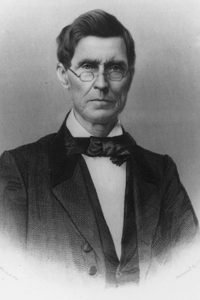- Augustus Baldwin Longstreet
Infobox Writer
name = Augustus Baldwin Longstreet

imagesize =
caption =
pseudonym =
birthname =
birthdate = birth date|1790|9|22
birthplace =Augusta, Georgia
deathdate = Dda|1870|7|9|1790|9|22
deathplace =Oxford, Mississippi
occupation = lawyer, minster, educator, humorist
nationality = American
period = 1833 - 1864
genre = Southern humor
subject =
movement =
notableworks =
spouse =
partner =
children =
relatives =
influences =
influenced =
website =Augustus Baldwin Longstreet (September 22, 1790-July 9, 1870) was an American lawyer, minster, educator, and
humorist , born in Augusta, Ga. He graduated at Yale (1813) and practiced law in Georgia, becoming a district judge in 1822 and holding the position for several years, after which he resumed his legal practice in Augusta, did editorial work, and established the "Sentinel", which soon merged with the "Chronicle" (1838). He became aMethodist minister and in a year was made president of Emory College (1839).After nine years he accepted the presidency of Centenary College,
Louisiana , then of theUniversity of Mississippi , where he stayed for six years, after which he resigned, and became a planter, but was tempted by the presidency of South Carolina College. In a few years, he returned to his old presidency in Mississippi.During his years as a Southern Methodist minister Longstreet preached a doctrine of secession and defended slavery. Scholar Lewis M. Purifoy notes that "Augustus B. Longstreet, in a baccalaureate address to the University of South Carolina graduating class of 1859, urged the young men of his audience to defend Southern rights to the utmost. While they should not strive to break up the Union, they should not ‘make a dishonorable surrender of the thousandth part of the mill more to save it.’ He defended slavery mainly on the ground that freeing [slaves] would be ruinous to Southern society; and the burden of his speech was that the South had suffered long and grievously at the hand of the North. Longstreet assured the class that secession would not lead to war, but, if it should, a united South would win.cite journal
last =Purifoy
first =Lewis M.
title =The Southern Methodist Church and the Proslavery Argument
journal =The Journal of Southern History
volume =32
issue =3
pages =325–41
date =August 1966
url =
doi =10.2307/2204792
id =
accessdate = Quotation is from p. 337.]His fame is based, however, on a single book, of which he was the author: "
Georgia Scenes " (1835), originally published in newspapers, then gathered into a volume at the South, and finally issued in 1840 in New York. It featured realistic sketches of Southern humor. It is said that he disavowed the second edition (1867) and tried to destroy the first. He died inOxford, Mississippi and is buried in section one of St. Peter's Cemetery.Augustus was a mentor for his nephew
James Longstreet , and was a long time friend and associate ofJohn C. Calhoun .Notes
External links
*" [http://docsouth.unc.edu/southlit/longstreet/menu.html Georgia Scenes, Characters, Incidents, &c. in the First Half Century of the Republic"] - digitalized at the University of North Carolina Website
*" [http://docsouth.unc.edu/imls/mitten/menu.html Master William Mitten, A Youth of Brilliant Talents Who was Ruined By Bad Luck] " - digitalized at the University of North Carolina Website.
Wikimedia Foundation. 2010.
